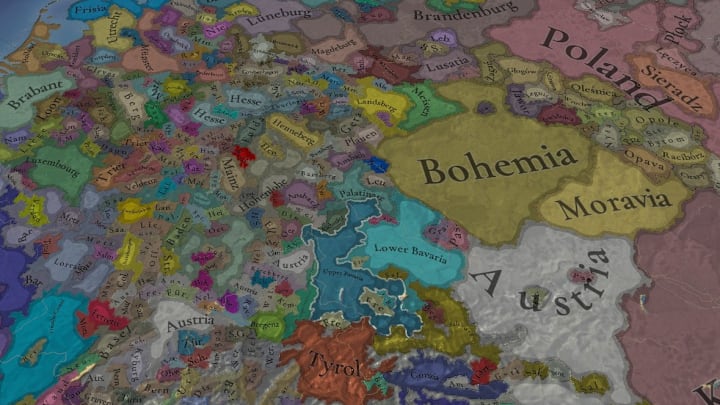EU5 HRE: How to play as Holy Roman Empire
By Marco Wutz

The Holy Roman Empire controls central Europe and much of Italy when Europa Universalis 5 starts in 1337, but having more than 300 smaller member states the HRE is far from united. In EU5, the HRE is an International Organization, meaning it has special mechanics all members can access.
Table of Contents
The Holy Roman Emperor is the central figure in this chaotic web of entities and it’s he who can initiate many of the exclusive mechanisms that make the HRE special.
Here’s a quick introduction to how the HRE works in EU5 and how you can play as the emperor right from the start.
How to play as Holy Roman Emperor in EU5
As mentioned above, the HRE is not a regular country in EU5, but an International Organization, so to play as the Holy Roman Emperor in 1337 you need to choose the member state led by the emperor at the time — and, surprise, that’s not Austria, but Upper Bavaria.
While the Habsburgs enjoyed almost unbroken electoral success in the HRE following the fall of the Staufers, the time around EU5’s start marks a short interruption of their imperial dominance. Both the Wittelsbachs and the Luxemburgs challenged the Habsburgs at elections in this period and were able to score successes, which is why Ludwig IV. of Bavaria, a Wittelsbach, rules the HRE when EU5 starts.
Unfortunately, the Bavarian is already at an advanced age when the game begins, so you likely won’t be able to enjoy the imperial throne for long — which brings us to the succession.
How to become Holy Roman Emperor in EU5
If you can’t claim its throne or conquer it like a regular country, how do you become Holy Roman Emperor? As indicated earlier, this is an elected position — not by a democratic vote, though.
There are seven states in the HRE which can cast their votes in an imperial election to crown the next emperor, known as the Prince-Electors and Archbishop-Electors. As the titles imply, four of them are worldly states and three of them are clerical states.
Here is the list of electors in 1337:
- Palatinate of the Rhine
- Kingdom of Bohemia
- Brandenburg
- Saxe-Wittenberg
- Trier
- Mainz
- Cologne
As you can imagine, you’ll need to use every trick in the political book to secure their votes — improve their opinion of you, bribe them, threaten them, or destroy them to make room for a more accommodating elector.
If you don’t want to start as the emperor and try your luck at the election instead, Austria’s Habsburgs and Bohemia’s Luxemburgs are in the best positions to make a strong bid.
How to gain Imperial Authority in EU5
Holding together 26 Free Imperial Cities, 52 Imperial Prelates, 195 Imperial Princes, one Imperial Peasant Republic (you do you, Frisia), and all the rest sounds difficult — and it is. However, the emperor can exploit their position over time to gain extra Ducats, Prestige, and so on, making the throne an attractive seat despite the hassle.
To do anything useful with the HRE, the emperor requires Imperial Authority. Similar to EU4, emperors gain this resource by keeping the HRE’s member states safe from external threats, expanding the empire, preserving the independence of members internally, and keeping the empire under a single faith.
The emperor has a variety of special diplomatic interactions with which to achieve these goals, such as being able to enforce peace between member states.
Imperial Authority, in turn, can be used to initiate law changes inside the HRE, starting with the Golden Bull — a sort of constitution the member states voted on in 1356 and that remained in force until 1806 when the HRE was dissolved. Naturally, there are many events specific to the HRE in which the resource can be gained and used as well.
It’s through these laws that the emperor’s position becomes more attractive, since they allow for concentration of power and privileges on top of the initial load, which includes the ability to force members to help you out in wars.
Alongside having special interactions in diplomacy and the International Organization screen, the emperor can initiate empire-wide parliament debates by choosing special HRE Parliament Issues in their own country’s parliament.
While only Prince-Electors can vote on the succession, all members of the HRE get votes on issues like law changes.
Next. EU5 economy guide. EU5: How to build up your economy and make money. dark